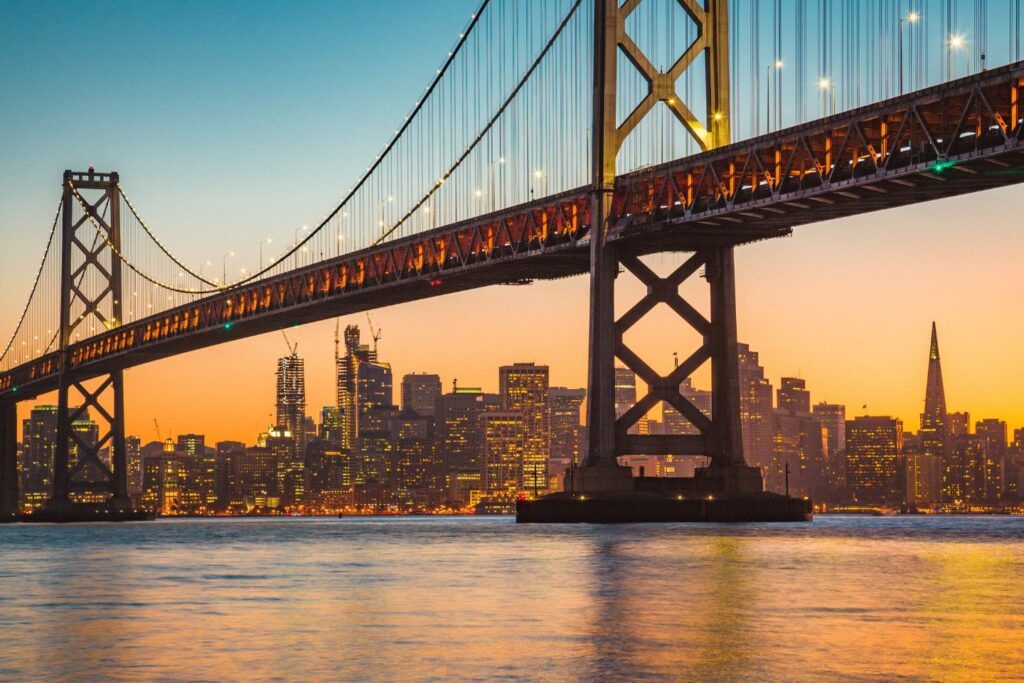If you’ve ever driven in San Francisco, you know it can be a challenging experience. Accidents are common with its steep hills, narrow streets, and heavy traffic. According to recent statistics, San Francisco has one of California’s highest car accident rates and ranked 31 in 2023. It was recorded that in every 100,000 people in the population, an average of 3.6 people die from traffic accidents.
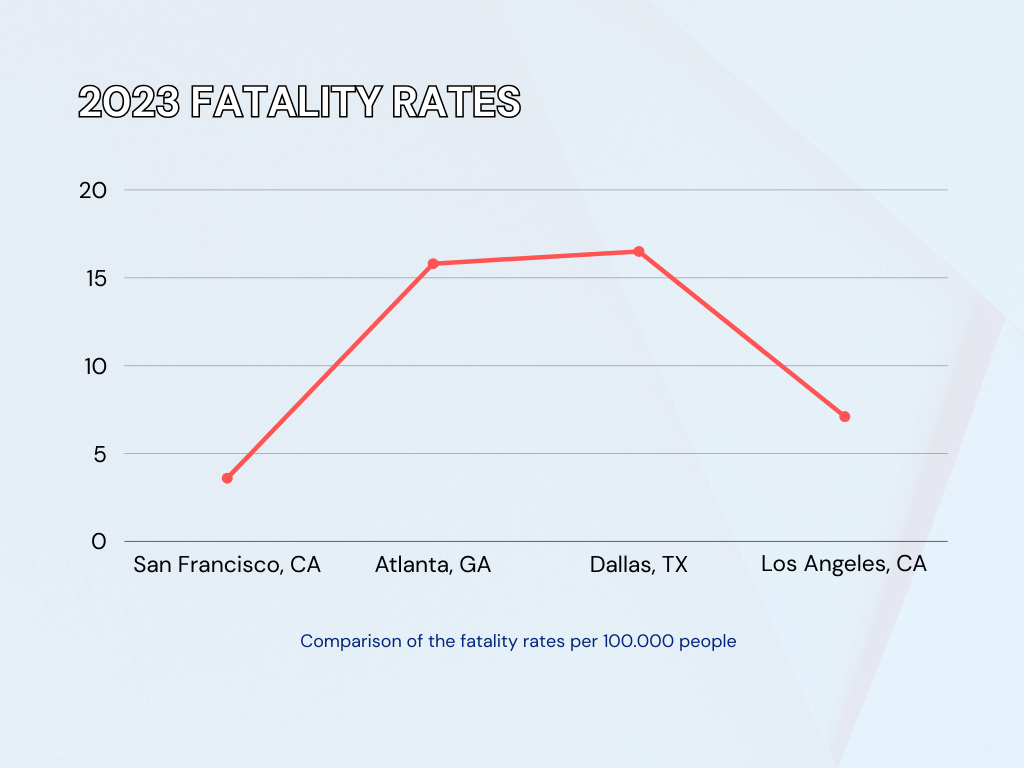

Just recently, on January 1st, a single rollover collision happened on Highway 1. It involved three people, leading to two people injured and one being pronounced dead. There was no clear reason, but officials are still investigating what happened.
Car accidents can happen for a variety of reasons, including distracted driving, speeding and driving under the influence of drugs or alcohol. The high traffic volume and challenging driving conditions in San Francisco can also contribute to accidents. Whether you’re a driver, passenger, or pedestrian, you must be aware of the risks and take steps to stay safe on the roads.
Common Causes of Car Accidents in San Francisco
Distracted Driving
Distracted driving is one of the most common causes of car accidents in San Francisco. The National Highway Traffic Safety Administration said that accidents caused by distracted driving are 23 times more likely to happen than other reasons. Distractions can include texting while driving, eating, drinking, or adjusting the radio. When you’re behind the wheel, staying focused on the road and avoiding any distractions that could take your attention away from driving safely is essential. Ed Reiskin, the SFMTA Director of Transportation, said there are limited statistics for incidents such as distracted driving. However, the community sees it every day and taking action towards it is a must.
With this, AB-47 stated that frequent violators or drivers seen holding any handheld device while driving would be penalized by having an extra point toward their licenses. This applies to those who violated the prohibition of using handheld devices without the capacity to be used during hands-free listening and talking within 36 months.
Speeding
Speeding is another common cause of car accidents in San Francisco. When you’re driving too fast, you have less time to react to changes in traffic or road conditions. This can increase your risk of being involved in a collision, especially in areas with heavy traffic or lots of pedestrians.
On January 1st, Assembly Bill 645 was implemented. This law says that speed cameras will be installed on the streets of San Francisco. This bill aims to reduce the rising number of accidents relating to speeding drivers. Most California highways allow drivers to go 65mph to 70 mph when overtaking. Going over this maximum speed limit violates one of the major speed laws of California. Not sticking to this law based on California Vehicle Code, Section 22348 can lead to penalties such as A fine of up to five hundred dollars ($500) may be imposed. Additionally, the court has the authority to suspend the individual’s privilege to operate a motor vehicle for a maximum period of 30 days.
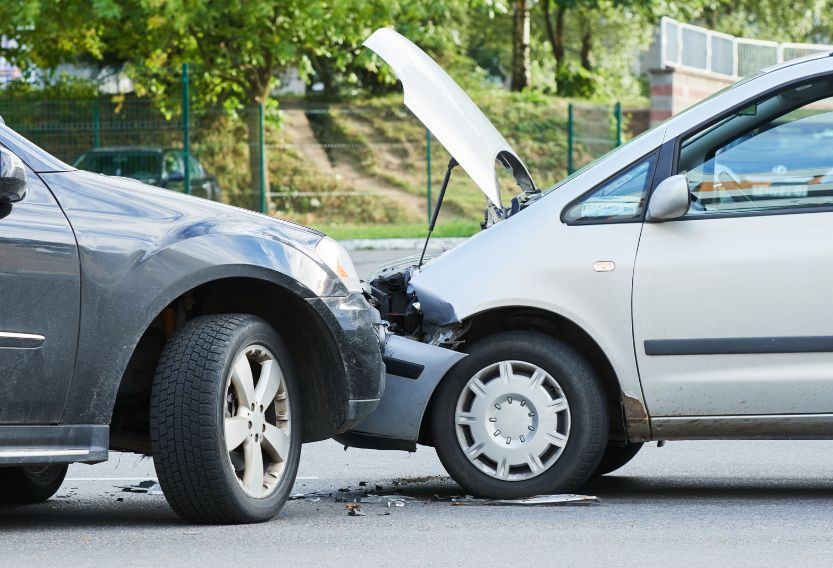

Driving Under the Influence
Driving under the influence of drugs or alcohol is a serious problem in San Francisco and it’s a leading cause of car accidents. If you’re planning to drink, have a designated driver or use a ride-sharing service to get home safely.
California law states that those who are caught being under the influence, such as drunk driving, warrant the DMV to suspend their license. In addition, you must pay fines, and your vehicle may be impounded. Moreover, law enforcement is legally allowed to measure your blood alcohol level when they suspect you of being under the influence. Below are the levels that are considered to be illegal:
- Exceeding 0.08% for individuals aged 21 and above.
- Surpassing 0.01% for individuals below 21 years of age.
- Maintaining a blood alcohol level of 0.01% or higher while on DUI probation, regardless of age.
- Reaching a level of 0.04% or higher when operating a commercial driver’s license-required vehicle.
- Achieving a blood alcohol level of 0.04% or higher when transporting passengers for hire.
Once you violate these laws, as a 1st-time offender, you may get the following penalties:
| Fines for a 1st California DUI: | Fines range from $390 to $1,000, with additional “penalty assessments” that can significantly raise the total amount.The overall cost can amount to several thousand dollars or more. |
| Jail Time for a 1st California DUI: | A first-time offender may face 48 hours to six months in jail.However, if probation is ordered, which is common, mandatory jail time is often waived.Judges frequently show leniency to first-time offenders, omitting jail time from the sentence. |
| License Suspension for a 1st California DUI: | Generally, a six-month license suspension is imposed for a first DUI conviction.The Department of Motor Vehicles (DMV) enforces an additional four-month administrative suspension for drivers with a BAC of .08% or more.Two suspensions may overlap, avoiding the need for two separate full suspensions.First-time offenders can apply for a restricted license, allowing travel to work and school, with the use of an ignition interlock device (IID). Those opting not to apply for the restricted license may need to install an IID for up to six months after license reinstatement. |
| California DUI Probation for a 1st Offense: | First-time DUI offenders typically receive a three-year term of informal probation, potentially extending to five years.As a probation condition, defendants usually must complete a three-month DUI school, consisting of 30 hours of classes.For individuals with BACs of .20% or more, the program is extended to nine months with 60 hours of class time. |
Overview of San Francisco Car Accidents
San Francisco is known for its high traffic and busy streets, which, unfortunately, results in an increased number of car accidents. According to data collected by the city, there were 5,136 traffic accidents resulting in injuries in 2023 alone. With that, the city of San Francisco has long implemented the Vision Zero SF project in 2014. This aimed to reduce any traffic fatalities and injuries that happens in the area. However, even with this initiative, the number of deaths due to traffic accidents is still increasing and not going down. With that, it has then received backlash.
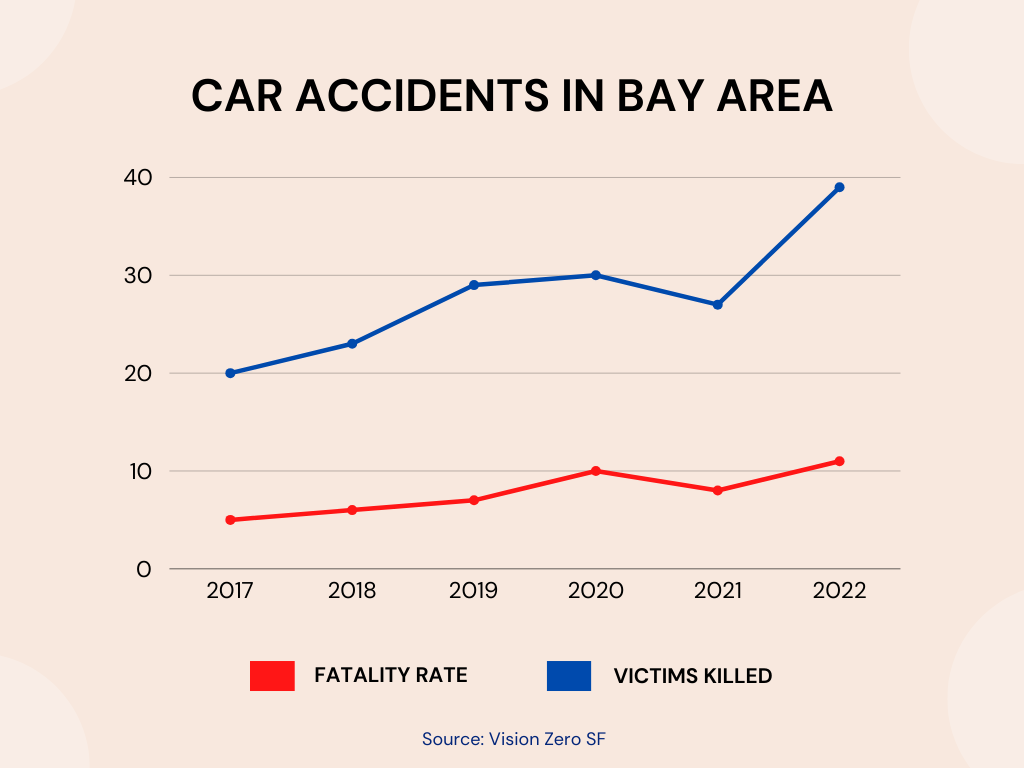

The most common causes of car accidents in San Francisco include speeding, distracted driving and driving under the influence. It is important to note that many of these accidents can be prevented by following traffic laws and being aware of your surroundings while driving.
On October 28th, a pedestrian was killed during a car crash on Post Street in Lower Nob Hill. It was said that the driver of the white BMW sped and ran a red light, causing a collision with another car and leading to the death of the pedestrian. Another accident that recently happened was a DUI. On January 14th, a 25-year-old woman lost her life. Law enforcement made two DUI arrests after a collision involving a blue Honda and a stationary Mercedes SUV on eastbound Interstate 80. A gray Honda crashed into the rear of the victim’s vehicle, resulting in the tragic death of the woman. The California Highway Patrol reported the incident, citing unknown reasons for the Mercedes stopping.
Apart from causing injuries, car accidents can also lead to property damage and in some unfortunate instances, they can be fatal. It is crucial to maintain adequate
Car
Legal Aspects of Car Accidents in San Francisco
If you have been involved in a car accident in San Francisco, it is important to understand the legal aspects of the situation. This section will provide you with an overview of the legal considerations that you should be aware of.
Understanding Fault and Liability
Establishing fault and liability is pivotal in any car accident scenario. In San Francisco, fault determination follows the principle of comparative negligence. This entails allocating a percentage of fault to each involved party based on their conduct leading up to the accident. For instance, if one driver was speeding while the other failed to yield, both drivers might shoulder a percentage of the blame.
On the flip side, liability pertains to the legal obligation for the accident and consequent damages. In California, drivers must possess liability
Insurance Claims Process
If you’ve experienced a vehicular incident in San Francisco, initiating an
When initiating a claim, you should furnish your
Personal Injury Protection (PIP)
Personal Injury Protection (PIP) stands as an elective
In the context of a car accident in San Francisco, it is prudent to contemplate the inclusion of PIP in your
Statute of Limitations for Filing a Claim
California imposes a time constraint, referred to as the statute of limitations, for commencing a claim subsequent to a car accident. This means there is a limited timeframe to either file a claim in court or negotiate a settlement with the
It is imperative to promptly seek guidance from an experienced car accident attorney in San Francisco after the incident to ensure compliance with all requisite deadlines and filing requirements for a claim.
Steps to Take After a Car Accident in San Francisco
If you have been involved in a car accident in San Francisco, taking the right steps immediately is essential to ensure your safety and protect your legal rights. Here are the steps you should take:
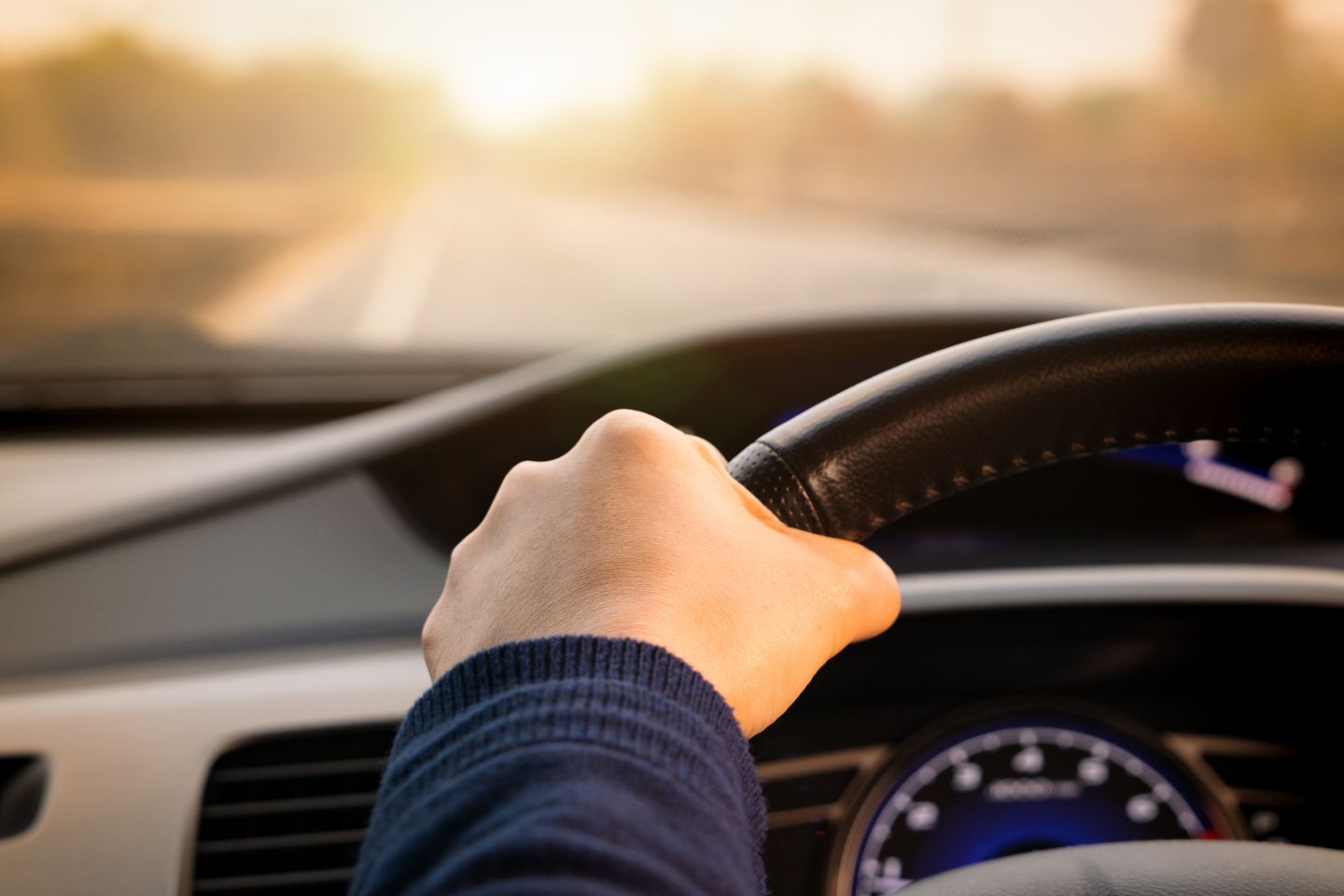

Safety and Medical Attention
The first and most important step is to ensure your safety and those of others involved in the accident. If anyone is injured, call 911 immediately and request medical assistance. If possible, move your vehicle to a safe location to prevent further accidents. Turn on your hazard lights and set up warning triangles or cones if you have them.
Reporting the Accident
In San Francisco, it is mandatory to report any accident leading to injury, death, or property damage exceeding $1,000 to either the California Highway Patrol or the local police department. Dial 911 to report the incident and request the presence of a police officer at the scene. It is crucial not to depart from the accident site without exchanging information with involved parties and reporting the incident to the police.
Documenting the Scene
Gather as much information as possible about the accident. Take photos of the scene, including the damage to all vehicles involved, any skid marks and the surrounding area. Exchange contact and
Contacting Insurance Companies
Report the accident to your
By following these steps, you can protect your legal rights and ensure that you receive the compensation you deserve for any injuries or property damage resulting from the accident.
Frequently Asked Questions
What steps should I take immediately after being involved in a car accident in San Francisco?
In the event of a car accident in San Francisco, prioritizing specific measures is crucial to safeguard yourself and your legal rights. Here are the essential points, each highlighted with transition words:
Prioritize Safety:
- First and foremost, prioritize safety for yourself and anyone involved.
- Seek medical attention if required to address immediate concerns.
Report the Accident:
- Subsequently, contact the police promptly to report the accident.
- Ensure the timely and accurate documentation of the incident by securing a police report.
Exchange Information:
- Additionally, exchange pertinent information with other involved drivers.
- This information should encompass names, contact details and
insurance information.
Legal Guidance:
- Ultimately, seek guidance from a seasoned car accident lawyer.
- This step is crucial to comprehensively understand your legal avenues and ensure the effective protection of your rights
How do I obtain a police report for a car accident that occurred in San Francisco?
To obtain a police report for a car accident in San Francisco, you can reach out to the San Francisco Police Department. Additionally, the department’s Traffic Collision Investigation Unit maintains records for all traffic accidents within the city. The process of requesting a copy of the police report can be completed online, in person, or through mail.
What are the common causes of the San Francisco Bay Area car accidents?
Numerous factors contribute to car accidents in the San Francisco Bay Area, such as distracted driving, speeding, reckless driving, driving under the influence of drugs or alcohol and poor road conditions. Additionally, adverse weather conditions and vehicle malfunctions can play a role in these incidents.
How long do I have to file a claim after a car accident in San Francisco?
In California, you typically have a two-year window from the date of the car accident to file a personal injury claim. It’s crucial to promptly consult with an experienced car accident lawyer after the incident to safeguard your legal rights and enhance the likelihood of a favorable outcome.
What compensation can I seek if I’ve been injured in a car accident in San Francisco?
If you’ve sustained injuries in a San Francisco car accident, you may have the opportunity to pursue compensation for various damages. This can include medical expenses, lost wages, pain and suffering and property damage. The potential compensation amount hinges on the unique details of your case.
Are there any specific laws in San Francisco regarding reporting car accidents?
In San Francisco, drivers must report any accident causing injury, death, or property damage exceeding $750. Failure to report may result in fines and penalties. Additionally, in accidents causing injury, death, or property damage over $750, drivers must exchange information and remain at the scene until the police arrive. (Source)
Been In An Accident in San Francisco?
In their pursuit of justice after a personal injury, The Personal Injury Center extends an invitation to connect with their experienced team. Specializing in aiding plaintiffs, they focus on unraveling the intricacies of legal cases related to personal injury. Our dedicated attorneys are committed to securing the compensation you deserve for your injuries and losses.
Don’t face the legal process alone—reach out to The Personal Injury Center today to ensure your rights are protected and to maximize your chances of a successful outcome. Your path to justice begins with a single call.



